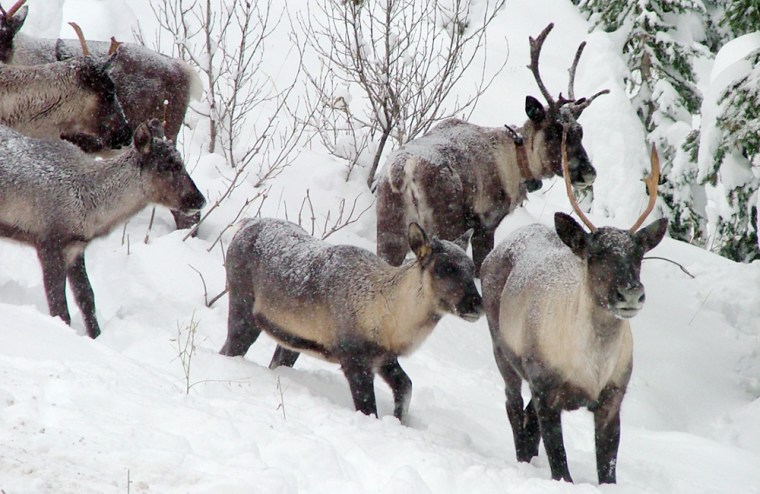In the frozen Selkirk Mountains near the Canadian border, the last tiny herd of caribou in the Lower 48 states is fighting for survival.
The less than three dozen remaining animals struggle with starvation, an increase of predators and, more recently, powerful snowmobiles that roar through their winter range.
Conservationists have sued to ban snowmobiles from caribou habitat, and tension between the groups is rising.
“There is no prospect for negotiation,” said Mark Sprengel of the Selkirk Conservation Alliance, whose members have been branded domestic terrorists by some snowmobilers. He feels the same way about some snowmobilers, saying “I think these people are capable of extreme acts.”
Critics contend snowmobiles disturb caribou during the winter, when they are already struggling to survive on low-nutrition lichen from old-growth trees. Modern snowmobiles have a wider range, allowing them to go deeper into caribou backcountry.
The groomed snowmobile trails also provide surer footing for deer, and the cougars that prey on them, to enter caribou habitat.
Caribou were listed under the Endangered Species Act in 1984, and are considered by some the most endangered animal in the Lower 48 states, Sprengel said. Herds numbering in the hundreds of thousands still roam in Alaska.
Lost cause?
Of the estimated 34 caribou in the south Selkirk herd, only three were spotted on the U.S. side of the border last winter.
That means the animals may be a lost cause in the area, said snowmobiler Tom Holman.
He says logging, wildfires and competition from other species caused the caribou decline, and the economic boost provided by snowmobilers to the tourist-dependent region should not be sacrificed.
“In winter time in the past, the resorts were closed and only one gas station was open,” said Holman, of Nordman, Idaho. “We created this economy from snowmobiling and cross-country skiing and we rely on it.”
But just before Christmas, a federal judge in Spokane, Wash., banned snowmobile trail grooming for the rest of the season. Although the order did not prohibit snowmobiling, ungroomed trails quickly become rough and impassable.
The conservation alliance had sued the U.S. Forest Service to force the agency to protect caribou. The ban covers about 77 miles of trails in the federally designated caribou recovery zone.
Caribou supporters say the ban leaves another 251 miles of ungroomed snowmobile trails and more 50,000 acres of snowmobile play areas within the recovery area.
The noisy machines are not the only threat to caribou. Logging of old-growth forests, which the caribou depend on for lichen, has increased on state lands in Idaho and in Canada. The logged land is ideal for white-tailed deer, which have exploded in numbers. In turn, the population of predators, such as mountain lions, has increased.
“These predators find the caribou and they are easy prey,” Sprengel said.
Different outcome in Canada
In Canada, the government has reached agreements with snowmobile clubs in that province to stay out of caribou habitat, Leo DeGroot of the British Columbia Ministry of the Environment said.
Similar efforts in the U.S. have failed, Holman said, because environmentalists want to completely remove combustion engines from the forest.
“We can’t make ourselves extinct,” he said.
The raw emotions involved were revealed in a recent op-ed piece by Holman in the Priest River Times newspaper, when he called environmentalists domestic terrorists.
“Bonner and Boundary County have been victimized by domestic terrorism,” Holman wrote, “and the areas will feel the financial pains as the winter season continues.”
Holman does not see his article as hostile. “It was honest,” he said.
But the words worry Sprengel.
“If you call people terrorists, it makes it easy for a nut to take out the enemy for God and country,” Sprengel said.
